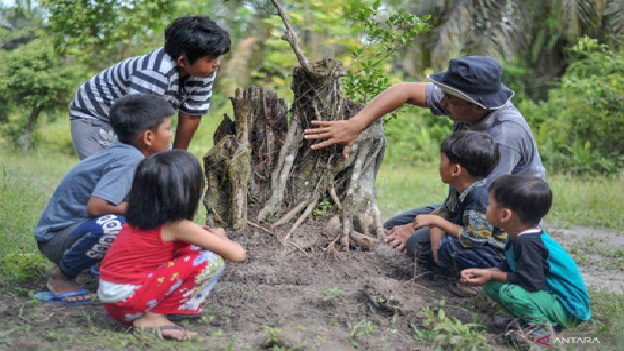Papua has an amazing natural landscape with various contents. Natural wealth is supported by cultural wealth that has been successfully passed on from one generation to another, making Papua a rich area with a variety of resources. Including education, Papua also has the potential to empower society through education, both formal and non-formal. Formal education has been experienced by the Papuan people following the curriculum and guidelines provided by the Central Ministry of Education and Culture and has similarities with education throughout Indonesia. Although there are several local contents that differentiate education in Papua from other regions in Indonesia. The natural and cultural riches that Papua possesses require other education, namely non-formal education. Papua has natural schools as an answer to this problem.
Nature schools are non-formal educational facilities that emphasize education regarding nature and existing culture. Papua, with its various natural and cultural riches, requires a nature school to introduce how local communities can live side by side with nature and hold tightly to the culture that has been passed down for as long as possible. Natural schools in Papua also provide facilities related to literacy, thereby creating a pleasant educational atmosphere. There is also education about culture, especially regional languages or local tribal languages, which are increasingly spoken by fewer and fewer people because they are more familiar with the national language. Nature schools are useful for Papuan people, especially children, to be able to understand the nature around them and include making the most of it while caring for and preserving it. Natural schools emphasize enjoyable cultural education by providing teaching about their native languages including the practice of traditional dances and songs found in Papua.
Some examples of natural schools in Papua are the Paradise Natural School founded by Yune Anggelia Rumateray which has been operating with an emphasis on environmental aspects. Students enrolled at Paradise Nature School are taken directly to nature such as rivers and forests to get to know the existing ecosystem. Apart from that, there is education regarding culture, namely Malind language education, which is the original language of one of the tribes in Papua, namely the Malind tribe. Other natural schools in Papua are the Yombe Yawa Datum Natural School and the Ciberi Natural School. The concept of the two natural schools is more or less the same as the Paradise Natural School.
The existence of natural schools in Papua complements formal schools. While formal schools aim to equalize Papua with other regions based on the curriculum and rules, non-formal schools in the form of natural schools are equipped with local content that provides knowledge to children in Papua about the natural and cultural riches they have. In the end, the nature school is able to make the Papuan people aware of how to preserve the wealth they have, both in terms of natural wealth and cultural wealth.


